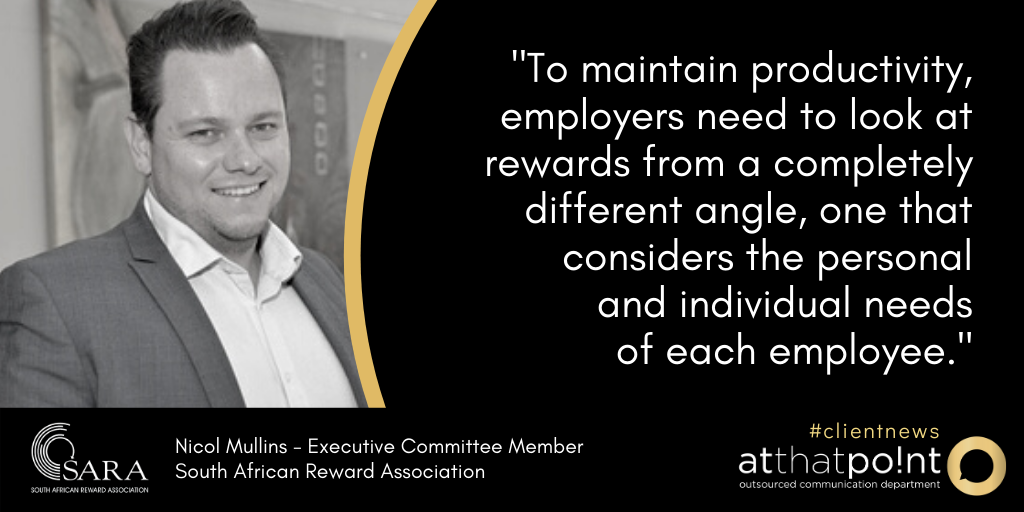|
By Nicol Mullins, chartered reward specialist and executive committee member of the South African Reward Association (SARA)
For most organisations, the importance of keeping their employees productive has never been more critical. For some, their very survival may depend on it. The way in which they structure rewards, that is, employee remuneration, benefits and incentives as a total package, has a significant influence on how well they will achieve that objective. Yet, life has changed beyond recognition, affecting workers and their perception of which rewards are most meaningful to them now. To maintain productivity, employers need to look at rewards from a completely different angle, one that considers the personal and individual needs of each employee. The value of rewards Rewards generally take the form of monetary and non-monetary compensation. In South Africa, in addition to basic pay, monetary compensation traditionally includes a retirement fund, medical cover and risk insurance, which form the basis of the total reward package. With corporate finances becoming stretched, greater emphasis on non-monetary rewards may give organisations the edge they are looking for. Specifically, this means better psychological support for employees and greater flexibility in employment conditions. Incidentally, this class of reward is exactly what many employees desire right now. For example, the ability to work from home allows exployees to save on travel while being more available to their families during these unprecedented times. However, this approach requires a change in attitude in two main areas. Firstly, employers need to think of rewards not as a cost to the company but as an enabler of productivity. It is therefore better to focus on developing rewards that encourage productivity in a given context rather than taking an approach of cutting costs across the board. Secondly, the reward offering needs to create an environment of trust. An environment of trust Giving employees greater flexibility in how they carry out their duties means trusting that they will do so to the best of their abilities. After all, if their organisation doesn’t trust them, why did they hire them in the first place? At the same time, employers can win their trust by understanding that their personal lives are severely affected by the pandemic, both emotionally and financially, and providing support where possible and appropriate. An environment of trust is one of psychological safety where employees feel cared for, trusted and valued. Without this foundation, employers will find it difficult to implement new benefits offerings simply because they will not expect them to succeed and therefore will not achieve their desired results or potential. Flexible conditions Allowing employees to work from home is one way of displaying trust. Organisations can also consider more flexible working times. Employees are undoubtedly working longer hours, so they need more frequent breaks. A quarter-day or half-day leave offering would allow them to take care of personal priorities and needs. This is also a good opportunity to experiment with shorter work weeks. Parents may need to drop their children at school, so scheduling meetings after 9 am and before 2 pm would respect that constraint. On the more practical side, a canteen on premises ensures that employees do not need to leave the building to eat. Complementing this with a play room or relaxation room will ensure they are more comfortable being at work. Communication However, the best way to develop new rewards is for employers to leverage the trust environment they creat. Instead of designing one-size-fits-all reward packages, they should realise that workers have different needs based on their specific life stage. By communicating with each staff member, they can individualise rewards that will evoke the best performance from their people. For example, should a retirement fund be mandatory or should they have the option to contribute to benefits that best suit their immediate needs? Whatever the final outcome, leaders must motivate their employees to perform like never before, and this will require them to try new, innovative and creative approaches to keep rewards relevant. ENDS MEDIA CONTACT: Rosa-Mari Le Roux, 060 995 6277, [email protected], www.atthatpoint.co.za For more information on SARA please visit: Website: www.sara.co.za Twitter: @SA_reward LinkedIn: South African Reward Association Facebook: SARA – South African Reward Association
0 Comments
Leave a Reply. |
Archives
March 2023
Welcome to the South African Reward Association newsroom.
Categories
All
|


 RSS Feed
RSS Feed